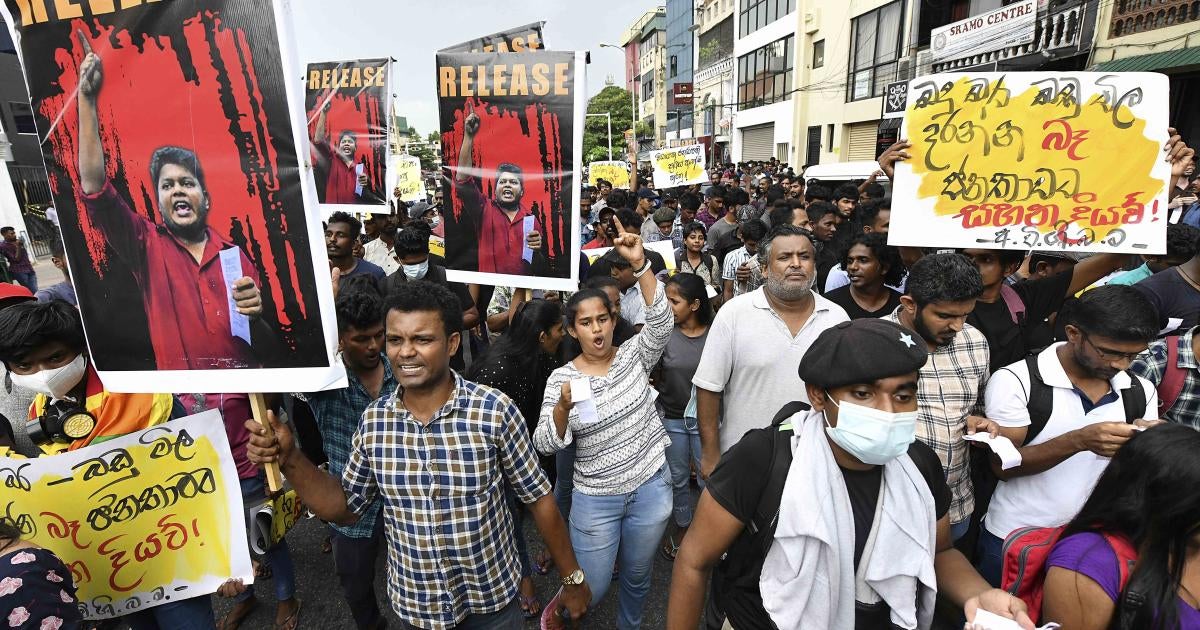(New York) – Sri Lankan President Ranil Wickremesinghe should immediately end the use of draconian anti-terrorism laws to target peaceful protesters and release those in detention, Human Rights Watch said today. Authorities have arrested three student activists who took part in a protest on August 18, 2022 under the abusive Prevention of Terrorism Act (PTA), which allows for up to a year of detention without trial.
Since being sworn in as President on July 21 following the flight and resignation of former President Gotabaya Rajapaksa, President Wickremesinghe has suppressed rights including the freedoms of expression, association and peaceful assembly. His administration imposed a month-long state of emergency, used security forces to violently disperse protesters and arrested dozens of people who had taken part in peaceful demonstrations. Successive governments have broken their promises to suspend the use of the PTA and replace it with rights-respecting legislation.
“President Wickremesinghe’s use of counter-terrorism legislation to lock up people peacefully calling for reform sends a chilling message to Sri Lankans that rights will not be prioritized during his tenure,” said Meenakshi Ganguly, director for the South Asia at Human Rights Watch. “The president’s crackdown on dissent at home flies in the face of his promises to allies abroad.”
The PTA was first adopted as a “temporary” measure in 1979 and contains numerous provisions contrary to international legal standards that have permitted arbitrary detention and torture. It has been used repeatedly to target government opponents and members of minority communities.
As prime minister in 2015, Wickremesinghe pledged to repeal the law when he backed a consensus resolution by the UN Human Rights Council. He reiterated this commitment in 2017, when Sri Lanka was readmitted to the European Union’s GSP+ scheme, which grants duty-free access to the EU market for Sri Lankan products in return for compliance with conventions. international human rights law.
In July, then-foreign minister GL Pieris told the UN Human Rights Council that Sri Lanka was observing a “de facto moratorium on arrests made under the PTA”. Earlier, on March 22, then-Justice Minister, now Foreign Minister Ali Sabry, told parliament that there was a “de facto moratorium on the use of the PTA for offenses other than those directly related to terrorism”.
The three men detained under the PTA are Wasantha Mudalige, head of the Inter-University Federation of Students (IUSF); Hashantha Jeewantha Gunathilake, member of Kelaniya University Students’ Union; and Galwewa Siridhamma Thero, the organizer of Inter University Bhikku [monks’] Federation. They were arrested following a protest on August 18 which police dispersed with tear gas and water cannons.
Wickremesinghe, who is also defense minister, then used the powers of the defense minister under the PTA to sign detention orders allowing the three men to be held for 90 days without evidence or an opportunity to seek release under bail. Orders can be renewed for up to one year. Lawyers for the men said they were being held in Tengalle prison in the south of the island in poor conditions and were unable to speak to lawyers without guards present, in violation of international standards.
Sri Lankan politicians and civil society organisations, including the Law Society, have condemned the detentions. Sri Lanka’s Human Rights Commission has stated that “no suspect exercising his basic rights under the Constitution should be wrongfully treated as a terrorist”.
Some of Sri Lanka’s international partners, whose government is seeking support to address the country’s economic crisis, have urged Wickremesinghe to end the crackdown on dissent and in particular the renewed use of the PTA. United States Ambassador Julie Chung posted on Twitter“The use of laws that do not conform to international human rights standards – such as the PTA – are eroding democracy in Sri Lanka.”
The EU said it was “[c]concerned about reports of the use of the Prevention of Terrorism Act in recent arrests, as we refer to the information provided [by the government of Sri Lanka] to the international community about the de facto moratorium on the use of the PTA”, and has repeatedly recalled Sri Lanka of its GSP+ obligations.
The Sri Lankan government is currently negotiating with the International Monetary Fund (IMF) for a multi-billion dollar bailout and is in talks with international creditors to restructure the country’s external debt. The Wickremesinghe government should show tolerance for peaceful dissent if the people of Sri Lanka are to have a chance of holding it accountable for how new international loans are spent, Human Rights Watch said.
“President Wickremesinghe appears determined to ignore calls from Sri Lankans for political reform and accountability, and from his allies abroad to improve respect for human rights,” Ganguly said. “As the people of the country face repression and economic hardship, Sri Lanka’s international partners must ensure that Wickremesinghe cannot ignore their message.”

